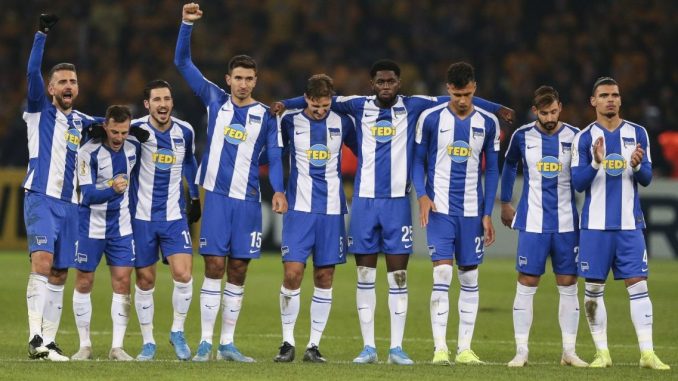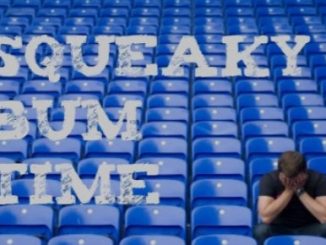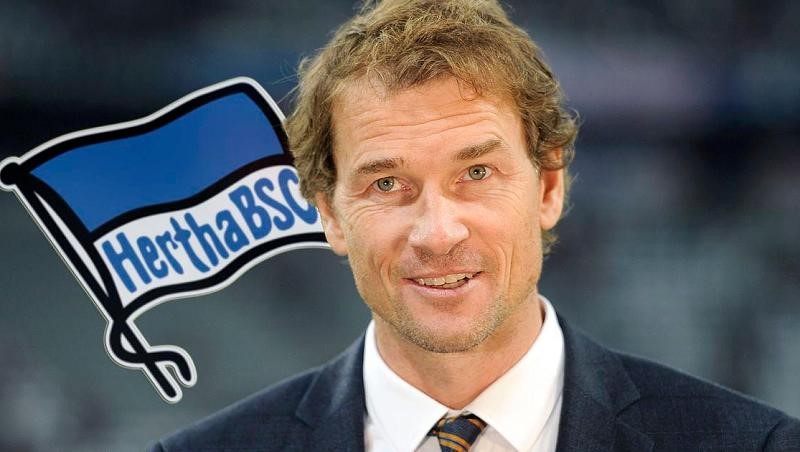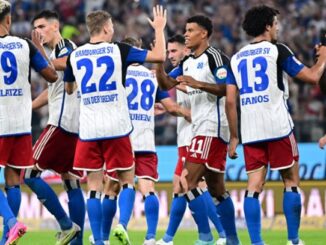
At least Hertha Berlin fans can’t complain that their season was dull. They went through four different coaches, hit the bottom of the league, bounced back, spent a record amount of money in January, had European ambitions, and then finished slap bang in the middle of the table.
The season began well as they held Bayern Munich to a 2-2 draw in the season curtain-raiser at the Allianz Arena, New trainer Ante Covic had been promoted from within to succeed Pal Dardai and things looked optimistic. Successive defeats to Wolfsburg, Schalke and Mainz however dumped them at the bottom of the table with four games gone.
They recovered with three wins of their own, only to slump once more to a run of four consecutive losses. It really was a case of all or nothing for Hertha. With 12 matches played and a 4-0 away defeat at Augsburg as well as defeat to Union in the first ever Bundesliga Berlin derby, the club called time on Ante Covic, realising that perhaps the job was too much for him.
In a surprise move Hertha installed Jürgen Klinsmann to the post ‘until the end of the season’ with the former Bayern and USA coach having joined the club’s board of directors shortly before.
It was however a marriage that would only last nine matches. Three wins, three draws and three defeats in those nine games wasn’t a terrible record, but then Klinsmann threw in the towel citing a lack of backing from the club (despite a huge outlay on new players in the January transfer window). An unwillingness to work with manager Michael Preetz was the real reason for his departure and he did himself no favours at all when a diary of his was leaked which criticised the club, the management, and the players.
Klinsmann left the club in 14th place and the club turned to his assistant Alexander Nouri in the first instance to take the helm. The former Werder Bremen coach was tainted with the Klinsmann brush though and lasted just four games (one win, two draws and a 5-0 defeat to Köln).
Time for trainer number four to take over when the Bundesliga emerged from it’s enforced corona virus hibernation and the club turned to Bruno Labbadia to steer them to the season’s end.
To many people’s surprise Labbadia instantly improved things at the Olympiastadion and began with three wins and a draw away at RB Leipzig. Union Berlin were dismantled 4-0 in the second derby of the season and the prospect of finishing in the top seven and achieving European football seemed imminent.
A horrible injury crisis however then hit, and the results started to slide. Four losses and only one win in their final five league games took the gloss off of Labbadia’s start, but the season ended with a 10th place finish and a sense of calm that had been missing during the dramas of the earlier campaign.
Highlight(s)
The second half comeback against Fortuna Düsseldorf on matchday 24 has to rank as one of the season highlights. 3-0 down by half time at the Merkur Spielarena, all hope looked to be lost for Hertha. They however produced a stunning comeback with an own goal from Erik Thommy, a Matheus Cunha strike and a Krzysztof Piatek penalty earning them a share of the spoils that looked highly unlikely at the interval.
The 4-0 demolition of Union in the second Berlin derby went some way to making up for the disappointment of losing in Köpenick earlier in the season. Bruno Labbadia cut his side loose in the second half with four unanswered goals. The only downside was that no fans were inside the Olympiastadion to witness it.
Lowlight(s)
The whole business with Jürgen Klinsmann left a bad taste in the mouth with the recriminations still being felt now. If there was a persona non grata at Hertha Berlin, you’d be hard pushed to find anyone less welcome than Klinsmann.
Losing the first derby at the Stadion an der Alten Försterei on matchday 10 wasn’t Hertha’s finest moment and they had to wait until May to gain revenge. The 5-0 home defeat to Köln on matchday 26 was dismal and only served to confirm that Alexander Nouri probably wasn’t the man to entrust the team to long-term. Matchday 12 also saw a 4-0 away defeat to Augsburg, where the Hertha side didn’t exactly cover themselves in glory.
Tale of the Tape
Record: 11-8-15, 41 points (1.21 per game), 10th in Bundesliga
Home Record: 21 points (6-3-8) Away Record: 20 points (5-5-7)
Goals: 48 (1.41 per game), Goals Against: 59 (1.74 per game), Diff: -11
xG: 41.1, xGA: 52.5, Diff: -11.4
Attack
Hertha scored 48 goals this season giving them an average of 1.41 goals per game. Vedad Ibisevivc and Dodi Lukebakio were the joint top scorers with seven goals apiece, with Matheus Cunha contributing six after joining in January. Fellow January arrival Krzysztof Piatek scored four in his 15 appearances (9 starts).
Ibisevic was a first choice and captain under Ante Covic, but found himself frozen out by Jürgen Klinsmann, making just one start under him. Bruno Labbadia immediately restored him to the starting XI and the Bosnian rewarded him with four goals after the Bundesliga resumed following the lockdown.
Matheus Cunha seemed to only score ‘worldie’ goals with his strike against Leverkusen and solo run versus Hoffenheim particularly impressive
The capital club actually ranked second bottom of the Bundesliga for both total shots (359 and only one above Augsburg) and shots on target (120- three less than Schalke), so there is work to be done on the training pitch in those regards.
Defence
With 59 goals conceded Hertha let in an average of 1.74 per game. Rune Jarstein began to show his age and make a few too many errors and Hertha are already looking to bring in a new keeper this summer. His fumble against RB Leipzig to allow Patrik Schick to score was the most glaring.
The central defensive partnership of Dedryck Boyata and Jordan Torunarigha established itself well towards the end of the season meaning Niklas Stark fell down the pecking order slightly, while Karim Rekik only made 14 starts.
Lukas Klünter was the first choice right back with Marvin Plattenhardt or Maxi Mittelstädt on the left.
Midfield
Marko Grujic anchored the midfield and after two seasons on loan at the Olympiastadion has returned to Liverpool. His absence next season will be sorely felt. He scored four and added one assist across the season and led the team for tackles in the midfield third.
Vladimir Darida joined him and ranked 6th in the league overall for pressures in the midfield third. He also led the entire league for the number of intensive runs made (2751). He also covered more distance that any other Hertha player (332.9km).
Per Ciljan Skjelbred was another key midfielder, but he is also leaving the club. Based on the Kicker ratings throughout the season, the Norwegian was Hertha’s best player in terms of average match rating.
Transfer Review
Hertha spent €33 million in the summer transfer window and then topped up with a further €77 million in January as they spent the first slice of investor Lars Windhorst’s cash injection.
Dodi Lukebakio was drafted in for €20 million after an impressive season for Fortuna Düsseldorf, and while he did score seven goals, there is much more to come from his you have to think. Getting Dedryck Boyata on a free transfer from Celtic proved a very good piece of business from Hertha as he enjoyed a very good debut season in the capital.
Daishawn Redan cost €2.7 million but was then loaned straight out to Eredivisie side Groningen, He will return and fight for a place next season. Hertha splashed out €7 million Eduard Löwen then loaned him to Augsburg in January. The signing of Marius Wolf from BVB on loan didn’t really work out.
The January signings were more impressive Lucas Tousart from Lyon cost €25 million, but he was allowed to remain in France until the end of the season. Krzysztof Piatek set BSC back €24 million from Milan and he showed promise as well as four goals. With Salomon Kalou, Vedad Ibisevic and Davie Selke all not at the club next season, the Polish striker will start as the number one in Bruno Labbadia’s strike force.
Matheus Cunha for €18 million looks an absolute bargain and the Brazilian seemed to enjoy a new lease of life at Hertha after finding life unsatisfactory over at RB Leipzig. Santiago Ascacibar was signed from VfB Stuttgart for €10 million and made seven starts before a foot injury ruled him out of Bruno Labbadia’s time in charge.
Player of the Season
Following his summer move from Celtic on a free, Dedryck Boyata instantly became the cornerstone of the Hertha defence and enjoyed a highly impressive first season in the Bundesliga. He ranked 2nd in the entire league for clearances (191) and 8th overall for interceptions (61). Pass completion rate of 93% putting him fourth overall in the Bundesliga.
Things didn’t start well for the Belgian as it was his rash lunge in the dying minutes of the first Berlin derby that handed Union a penalty, which Sebastian Polter converted to seal an historic win. He consistently improved and chipped in with four goals- including one in the return derby at the Olympiastadion.
Grade: C
It could have been worse, but then again it could have been better for Hertha this season. Had injuries not wrecked the final part of the season for Bruno Labbadia, we might have been talking about Hertha competing in next year’s Europa League, but it wasn’t to be.
The season as a whole is also hard to judge when there were four different coaches in charge. The Covic period was one where the trainer was sadly out of his depth, the Klinsmann period was surreal and more about ego than performance, while the Labbadia period brought a huge amount of optimism.
A midtable finish was about right, but next season should see a concerted push to get into the European places. Unlike a lot of clubs, Hertha have money to spend, but it must be spent wisely.



